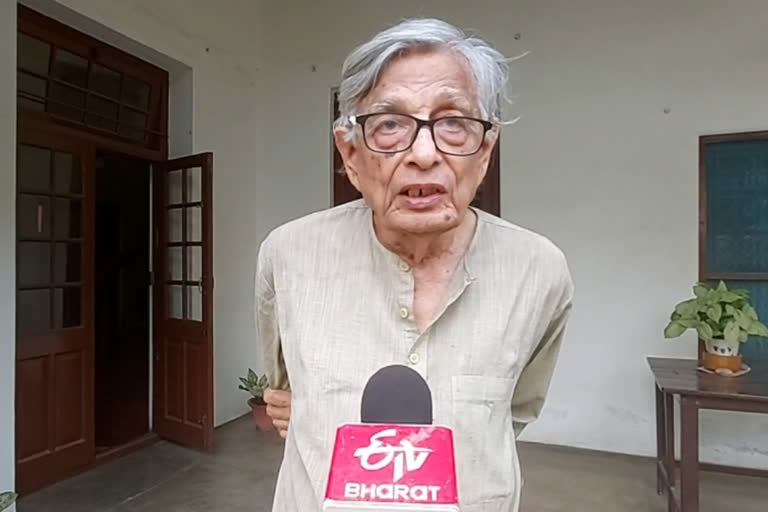Aligarh (Uttar Pradesh): Eminent historian Irfan Habib in an exclusive interview with ETV Bharat set the records straight regarding the destruction of temples at Varanasi and Mathura by Mughal emperor Aurangzeb and suggested how the government should approach the issue through the laws already in place.
"It is true that Aurangzeb destroyed temples. This is known to everyone and it is on the record. The Gyanvapi structure was never a Shivji's (sic) temple. There is no mention as such. It could be a temple belonging to either Saivaite or Vaishnavite sects. They (Hindu petitioners) claim they have found deities of both the sects which is not possible," Irfan Habib said when he was asked what he has to say on the Gyanvapi imbroglio.
"In their petition seeking survey of Gyanvapi mosque, they have not mentioned anything about the Shivling but of the Saivaite and Vaishnavite deities. After the purported discovery of 'Shivling' during the survey, they are claiming it to have been a Shivji's (sic) temple," he pointed out.
On recovery of some sculptures and motifs belonging to the Hindu religion at the Gyanvapi mosque site, Habib said, "I didn't know about such findings. But, yes it may be true or may be not. Whenever an old temple or mosque is demolished or renovated, you may find stone remnants of Buddha viharas."
"It is quite natural for those renovating or constructing a religious structure to use the stones which readily available from the decommissioned structure. It will be ridiculous if the Buddhists can stake claims for such religious structures. This also doesn't mean that based on that (findings) the temple or mosque should be brought down. It will be sheer foolishness," the historian explained on the evolution of religious structures.
Habib said he was a historian when asked whether the politicisation of the issue is a precursor in the runup to the Lok Sabha 2024 elections. "I am a historian. What happens in coming days is not for me to predict. It may be your job to speculate which leads to what," he said.
Delving into Aurangzeb's legacy of temple demolitions, Habib said Aurangzeb definitely did destroy temples. "He destroyed the Varanasi temple. He also razed down the Keshav Rai temple in Mathura. This was a huge temple. It was constructed by Vir Singh Bundela during the Jehangir's regime," the historian said.
"Beyond doubt it is established that these two temples — one at Varanasi and the other at Mathura — were demolished by Aurangzeb. But, the question here is, these structures, which were constructed in 1670, could they now be demolished by the government," Habib asked.
"This is totally against the Indian Monuments Act. The Supreme Court gave away land to them (Hindus) at Ayodhya. They (the court) created a new perspective while giving judgment in the Babri Masjid case. Muslims perspective was not taken into consideration. Things might unfold in the same manner as it did in Ayodhya case," Habib said.
"There is a Minar (tower) built by Rana Kumbha at Chittorgarh in Rajasthan. The tower features sculptures of Hindu deities in the bottom. At the top of the tower, the word 'Allah' is inscribed twice in Arabic. Does it imply that it was a mosque and Muslims should stake claim over that structure. It will be sheer foolishness," Habib reasoned.



